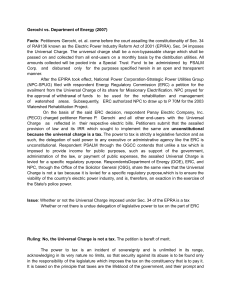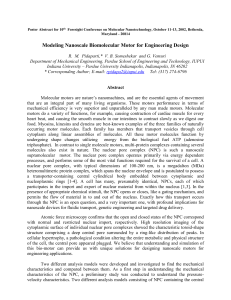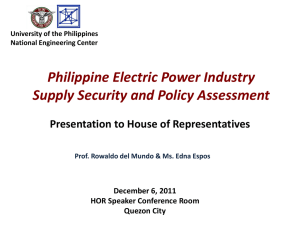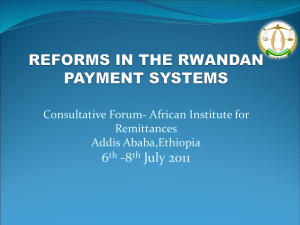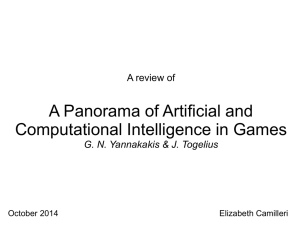EPIRA Impact to Workers_apl-sep2012
advertisement
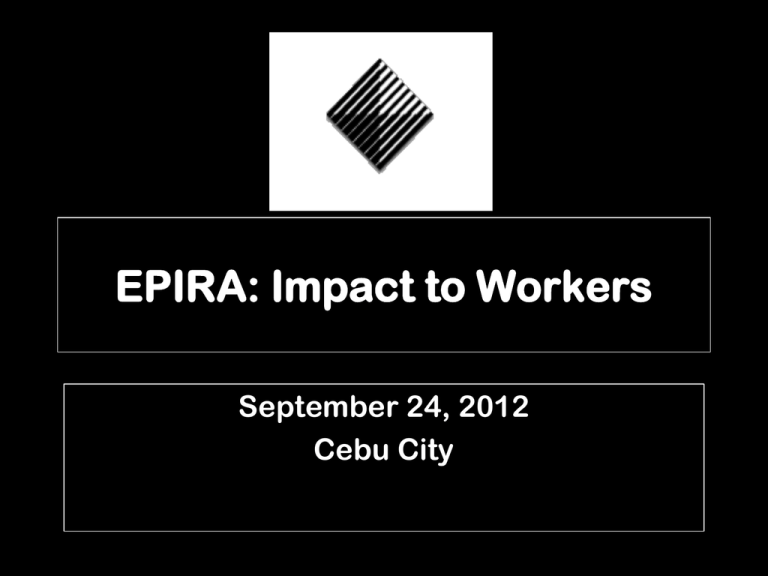
EPIRA: Impact to Workers September 24, 2012 Cebu City The EPIRA IRR, Rule 33, Section 5. mandates “The Preferential Rights of Employees” Displaced or separated personnel as a result of the restructuring and privatization of NPC assets shall be given preference in the hiring of manpower requirements of the newly-created offices or the privatized companies: Provided, That the displaced or separated personnel meet the prescribed qualifications. With respect to employees who are not retained by NPC, the DOLE shall endeavor to implement retraining, job counselling, and job placement programs.( But this never happened) What happened? Massive job losses due to retrenchment WORKERS 1994 1997 NAPOCOR 17,000 13,500 TRANSCO NPC Residual Force 2003 2012 7,400 1,500 200 NGCP 4,500 TOTAL 6,200 GR No. 156208, NPC DAMA vs. NPC, September 17, 2008 • What the Supreme Court says? • NPC employees, who were illegally terminated to give way to the re-organization of the corporation in 2002, are entitled to separation pay, back-wages, wage adjustments, and other benefits accruing from January 31, 2003 to the date of payment under a validly approved Separation Program. • The Court said that as a logical and necessary consequence of its earlier decision, the terminated employees have the right to such benefits as it is already impossible for them to be reinstated. • ADB says (PHP 34.7 B) is part of the cost of the Power Sector Restructuring Program. The restructuring lead to a systematic dislocation of regular work! Illegal dismissal Retrenchment Privatization of NAPOCOR and TRANSCO Probationary of 165 days Multi-skill and multi-tasks Discrimination on wages Roll back benefits Non recognition of union Anti union bias Violation of Trade Union Rights • SC in G. R. 62386, entitled, BATELEC I Labor Union vs Young, G. R. No. 70880, entitled Bulacan II Electric Coop., vs Penaflor and G. R. 74560, entitled ALECO I vs Trajano, all dated November 9, 1988, which reads: • “The common issue raised is whether or not employees of electric cooperatives are qualified to form or join labor organizations for purposes of collective bargaining” • In Cooperative Rural Bank of Davao City, Inc. Vs Pura Ferrer-Calleja, Director, Bureau of Labor Relations, et al., G. R. No. 77951, September 26, 1988, it was held that an employee of a cooperative who is a member and co-owner thereof cannot invoke the right to collective bargaining. • This drives the workers in the ECs to form “Employees Association” dependent on NEA policies and divisive to labor rights. NEA Prescription to Curable and Incurable ECs : Corporatization- a Threat to Workers! • • • • Creditors Offer - due to obligations owing to them, the creditors will be given first preference to make an offer to manage, operate and invest in ALECO Concession/Lease – for a concession/rental fee, allows the investor to manage, operate, repair, decommission and refurbish facilities in the service area (concession), pay obligations, for a term usually within the franchise period Investment Management Contract – involves substantial investments in and management of the EC by a private investor, the specific terms of which are governed by a contract Management Contract - private sector initiatives similar to Investment Management Contract except that, in this case, only management expertise is infused The appropriate initiatives shall be determined by ALECO and 7 the investor with the best offer. Investor Owned Utilities under EPIRA: Effects to Unions • 2008, when the consumers petition the high electricity rates of Davao Light Power which are charged to system loss, the union “free light services” were roll-back, now case pending at Court of Appeals; • Presently, the Mactan Electric Company are arbitrarily terminating regular workers for rendering “flying connection services” to consumers and hazards to safety and accidents are prevalent; • In both IOUs, in violation of the DO No. 18-A series of 2011; contractual work are rampant ; • Trend of electricity skilled workers are applying for abroad- a manifestation that the industry is not competitive in terms of wages and benefits. While jurisprudence states... • The preservation of the lives of the citizens is a basic duty of the State, more vital than the corporate profits. (Manila Electric Company vs. NLRC, G.R. No. 78763, Jul. 12, 1989) • Coupled with the concept of collective negotiation is the right of workers to “participate in policy and decision-making processes affecting their rights and benefits as may be provided by law.” (1987 Constitution in Art. XIII, Social Justice and Human Rights) • In most instances, these are denied and violated. • Why? Because of corporate control and grave abuse of management discretion… A disaster to the working class: Loss of Load Expectation of 180-days brownout in 2013 by curtailment at Mindanao (UP NEC Simulation) Operating outage 1 Scheduled Maintenance and Forced Outage Rate Hydro Power Plant Water Availability 1,400 1,200 2 1,000 800 MW 600 3 400 Load Variations 200 0 Typical Power Generation of Hydro Plants 0 12 24 36 48 60 72 84 96 108 120 132 144 156 168 Typical Weekly Load of Mindanao Where are the workers? WORKERS NPC TRANSCO Residual Force NGCP Electric Cooperatives Investor Owned Utilities ESTIMATED NUMBER 1,500 200 4,500 24,000 19 private companies Contractual Workers unaccounted MERALCO Consumers 4 Million RECs Consumers 8 Million If those numbers are translated into a strong united labor front, then unions as vehicle can transform the situation… Policies therefore, reflects a compromise in a social struggle between workers and employers… If No Struggle = there is No Threat = and No Compromise Compromise shifts the balance of power relations! And Laws are Revised to reflect this shift. • In other words, workers have a stake in transforming the power industry. • To do so, workers need to reclaim power – Political Power! • But to reclaim political power, we need to: Unify strong workers unions Unify vigilant & progressive consumer groups Unify effective & efficient management Democratic power governance is institutionalize Is Democratization and Reform of the EC possible? I subscribe Yes... Based on the ALEO experience: • What was the context? • Why the workers union lead? • How do workers and consumers do it, their role and significant contribution in the struggle? • What is the alternative? • The ways forward! Thank you!
